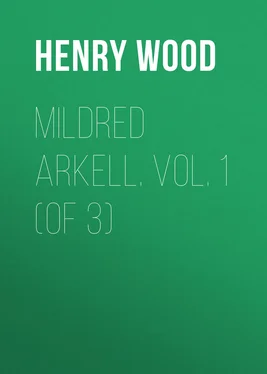Henry Wood - Mildred Arkell. Vol. 1 (of 3)
Здесь есть возможность читать онлайн «Henry Wood - Mildred Arkell. Vol. 1 (of 3)» — ознакомительный отрывок электронной книги совершенно бесплатно, а после прочтения отрывка купить полную версию. В некоторых случаях можно слушать аудио, скачать через торрент в формате fb2 и присутствует краткое содержание. Жанр: foreign_sf, literature_19, foreign_antique, foreign_prose, на английском языке. Описание произведения, (предисловие) а так же отзывы посетителей доступны на портале библиотеки ЛибКат.
- Название:Mildred Arkell. Vol. 1 (of 3)
- Автор:
- Жанр:
- Год:неизвестен
- ISBN:нет данных
- Рейтинг книги:4 / 5. Голосов: 1
-
Избранное:Добавить в избранное
- Отзывы:
-
Ваша оценка:
- 80
- 1
- 2
- 3
- 4
- 5
Mildred Arkell. Vol. 1 (of 3): краткое содержание, описание и аннотация
Предлагаем к чтению аннотацию, описание, краткое содержание или предисловие (зависит от того, что написал сам автор книги «Mildred Arkell. Vol. 1 (of 3)»). Если вы не нашли необходимую информацию о книге — напишите в комментариях, мы постараемся отыскать её.
Mildred Arkell. Vol. 1 (of 3) — читать онлайн ознакомительный отрывок
Ниже представлен текст книги, разбитый по страницам. Система сохранения места последней прочитанной страницы, позволяет с удобством читать онлайн бесплатно книгу «Mildred Arkell. Vol. 1 (of 3)», без необходимости каждый раз заново искать на чём Вы остановились. Поставьте закладку, и сможете в любой момент перейти на страницу, на которой закончили чтение.
Интервал:
Закладка:
And once more putting down her work, but not in anger this time, she went to open the front door, at which Robert Carr was knocking.
CHAPTER III.
THE ADVENT OF CHARLOTTE TRAVICE
Mrs. George Arkell sat near her breakfast-table, deeply intent on a letter recently delivered. The apartment was a rather spacious one, handsomely fitted up. It was the general sitting-room of the family; the fine drawing-room on the other side of the hall being very much kept, as must be confessed, for state occasions. A comfortable room, this; its walls hung with paintings in water-colours, many of them William's doings, and its pleasant window looking across the wide yard, to the iron railings and the street beyond it. The room was as yet in the shade, for it faced due south; but the street yonder lay basking in the bright sun of the September morning; and Mrs. Arkell looked through the open window, and felt almost glad at the excuse the letter afforded her for going abroad in it.
Letters were not then hourly matters, as they are now; no, nor daily ones. Perhaps a quiet country lady did not receive a dozen in a year: certainly Mrs. Arkell did not, and she lingered on, looking at the one in her hand, long after her husband and son had quitted the breakfast-table for the manufactory.
"It is curious the child should write to me," was her final comment, and the words were spoken aloud. "I must carry it to Mrs. Dan, and talk it over with her."
She rang the bell for the breakfast things to be removed, and presently proceeded to the kitchen to consult with the cook about dinner—for consulting with the cook, in those staid, old-fashioned households, was far more the custom than the present "orders." That over, Mrs. Arkell attired herself, and went out to Mrs. Daniel Arkell's. Mrs. Dan was surprised to see her so early, and laid her spectacles inside the Bible she was reading, to mark the place.
"Betty," began Mrs. Arkell, addressing her sister-in-law by the abbreviation bestowed on her at her baptism, "you remember the Travices, who left here some years ago to make their fortune, as they said, in London?"
"To be sure," replied Mrs. Dan.
"Well, I fear they can't have made much. Here's a letter comes this morning from their eldest girl. It's very odd that she should write to me. A pretty little thing she was, of about eight or ten, I remember, when they left Westerbury."
"What does she write about?" interrupted Mrs. Dan. "I'm sure they have been silent enough hitherto. Nobody, so far as I know, has ever heard a word from any of them since they left."
"She writes to me as an old friend of her father's and mother's, she says, to ask if I can interest myself for her with any school down here. I infer, from the wording of the letter, that since their death, the children have not been well off."
"John Travice and his wife are dead, then?"
"So it would seem. She says—'We have had a great deal of anxiety since dear mamma died, the only friend we had left to us.' She must speak of herself and her sister, for there were but those two. Will you read the letter, Betty?"
Mrs. Dan took her spectacles from between the leaves of the Bible, and read the letter, not speaking immediately.
"She signs herself C. Travice," remarked Mrs. George; "but I really forget her name. Whether it was Catherine or Cordelia–"
"It was Charlotte," interposed Mrs. Dan. "We used to call her Lottie."
"The curious thing in the affair is, why she should write to me ," continued Mrs. George Arkell. "You were so much more intimate with them, that I can only think she has made a mistake in the address, and really meant the letter for you."
A smile flitted over Mrs. Dan's face. "No mistake at all, as I should believe. You are Mrs. Arkell, you know; I am only Mrs. Dan. She must remember quite well that you have weight in the town, and I have none. She knows which of us is most capable of helping her."
"But, Betty, I and George had little or no acquaintance at all with the Travices," rejoined Mrs. Arkell, unconvinced. "We met them two or three times at your house; but I don't think they were ever inside ours. You brought one of the little girls to tea once with Mildred, I recollect: it must have been this eldest one who now writes. You, on the contrary, were intimate with them. Why, did you not stand godmother to one of the little ones?"
"To the youngest," assented Mrs. Dan, "and quite a fuss there was over it. Mrs. Travice wanted her to be named Betty; short, after me; but the captain wouldn't hear of it. He said Betty was old-fashioned—gone quite out of date. If you'll believe me it was not settled when we started for the church; but I decided it there, for when Mr. Elwin took the baby in his arms, and said, 'Name this child,' I spoke up and said, 'Elizabeth.' She grew to be a pretty little thing, too, meek and mild as a lamb; Charlotte had a temper."
"Well, I still retain the opinion that she must have been under the impression she was addressing you. 'I write to you as an old friend of papa and mamma's,' you see, she says. Now that can't in any way apply to me. But I don't urge this as a plea for not accepting the letter," Mrs. George hastened to add; "I'm sure we shall be pleased to do anything we can for her. I have talked the matter over with George, and we think it would be only kind to invite her to come to us for a month or so, while we see what can be done. We shall pay her coach fare down, and any other little matter, so that it will be no expense to her."
"It is exceedingly kind of you," remarked Mrs. Dan Arkell. "And when you write, tell her we will all try and make her visit a pleasant one," she added, in the honest simplicity of her heart. "Mildred will be a companion to her.'
"I shall write to-day. The letter is dated Upper Stamford-street: but I'm sure I don't know in what part of London Upper Stamford-street lies," observed Mrs. Arkell, who had never been so far as London in her life, and would as soon have thought of going a journey to Cape Horn. "Where's Mildred?"
"She's in the kitchen, helping Ann with the damson jam. I did say I'd not have any made this year, sugar is so expensive, but Mildred pleaded for it. And what she says is true, that poor Peter comes in tired to death, and relishes a bit of jam with his tea, especially damson jam."
"I fear Peter's heart is not in his occupation, Betty."
Mrs. Dan shook her head. "It has never been that. From the time Peter was first taken to the Cathedral, a little fellow in petticoats, his heart has been set upon sometime being one of its clergy; but that is out of the question now: there's no help for it, you know."
Mildred came in, bright and radiant; she always liked the visits of her aunt George. They told her the news about Miss Travice, and showed her the letter.
"Played together when we were children, I and Charlotte Travice," she said, laughing; "I have nearly forgotten it. I hope she is a nice girl; it will be pleasant to have her down here."
"Mildred, I should like to take you back with me for the day. Will you come? Can you spare her, Betty?"
Mildred glanced at her mother, her lips parting with hope; dutiful and affectionate, she deferred to her mother in all things, never putting forth her own wishes. Mrs. Dan could spare her, and said so. Mildred flew to her chamber, attired herself, and set forth with her aunt through the warm and sunny streets—warm, sunny, bright as her own heart.
Very much to the surprise of Mrs. Arkell, as she turned in at the iron gates, she saw the carriage standing before the door, and the servant Philip in readiness to attend it. "Is your master going out?" she inquired of the man.
"Mr. William is, ma'am."
"Where to, do you know?"
"I think it is only to Mr. Palmer's," returned Philip. "I know Mr. William said we should not be away above an hour."
Читать дальшеИнтервал:
Закладка:
Похожие книги на «Mildred Arkell. Vol. 1 (of 3)»
Представляем Вашему вниманию похожие книги на «Mildred Arkell. Vol. 1 (of 3)» списком для выбора. Мы отобрали схожую по названию и смыслу литературу в надежде предоставить читателям больше вариантов отыскать новые, интересные, ещё непрочитанные произведения.
Обсуждение, отзывы о книге «Mildred Arkell. Vol. 1 (of 3)» и просто собственные мнения читателей. Оставьте ваши комментарии, напишите, что Вы думаете о произведении, его смысле или главных героях. Укажите что конкретно понравилось, а что нет, и почему Вы так считаете.












